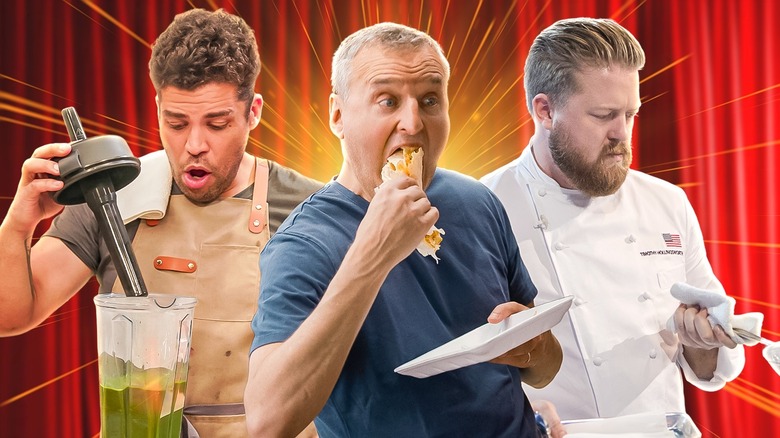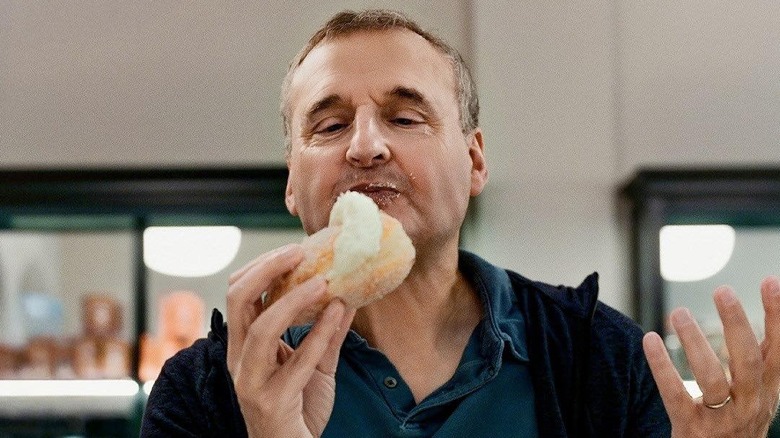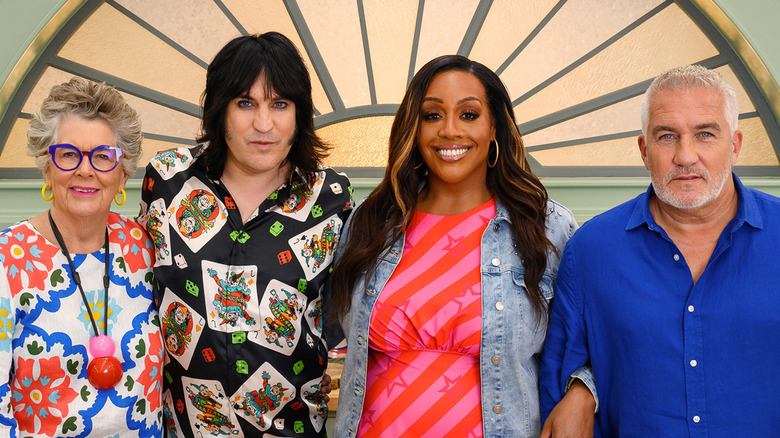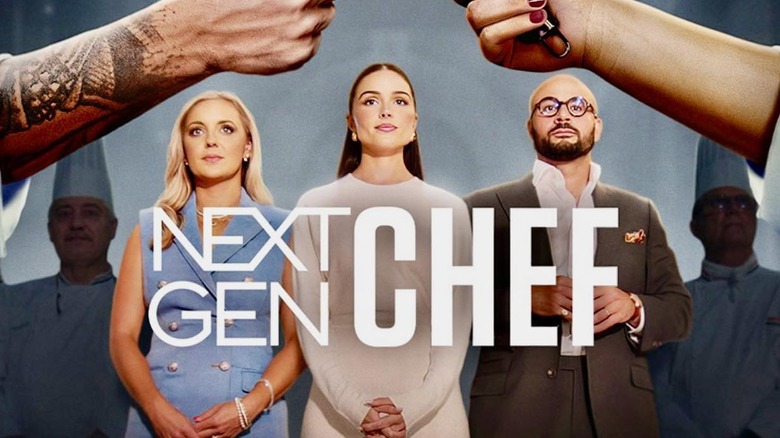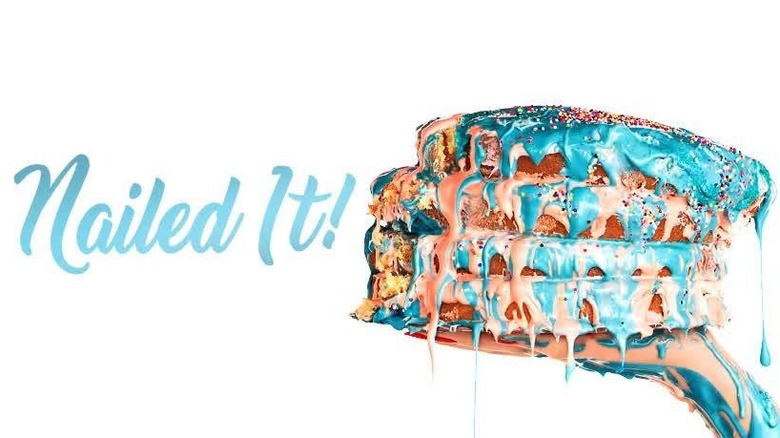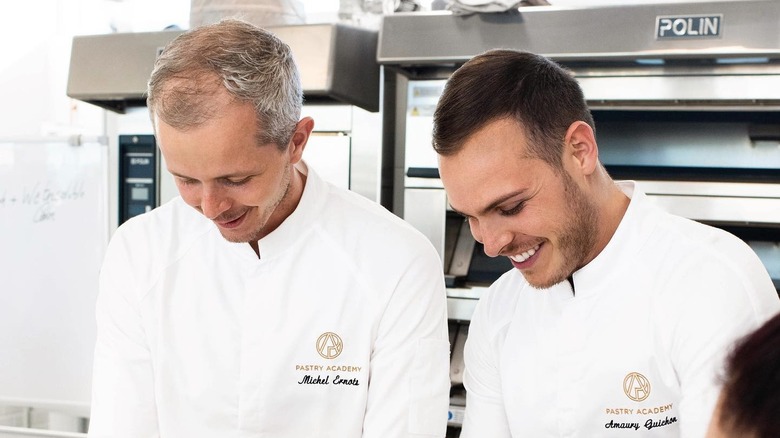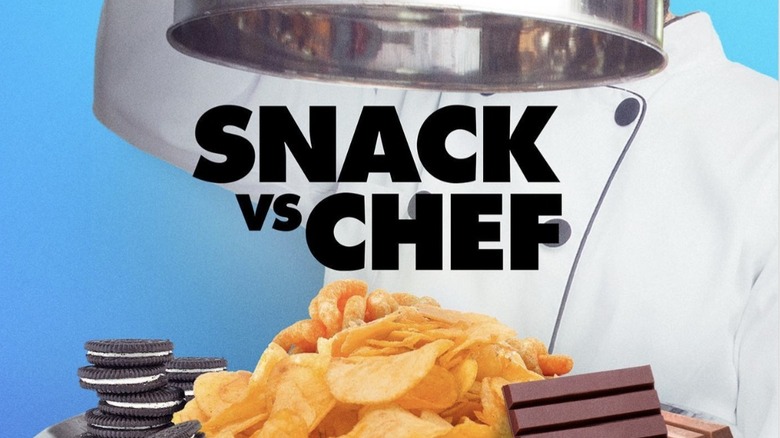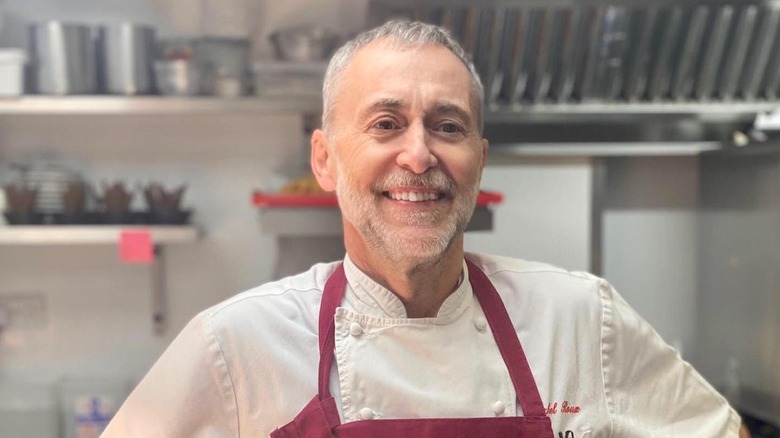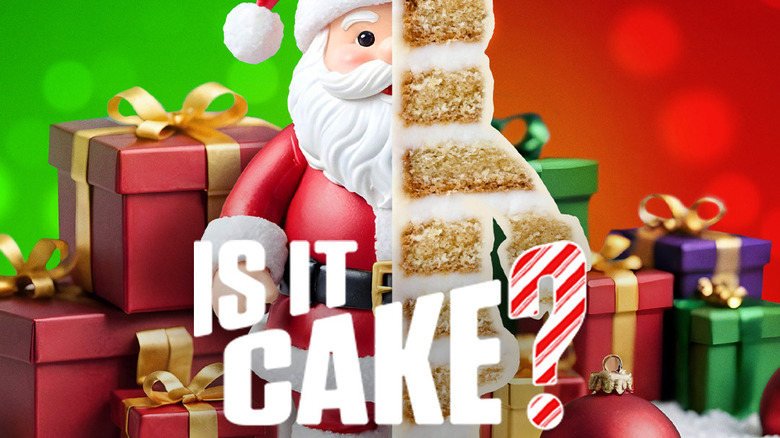The 12 Wildest Cooking Shows On Netflix Right Now
I've struggled through my own challenging journey as a chef, garnering a soft spot for reality cooking shows along the way. It's no surprise that there's something deeply compelling about watching people who are in a situation similar to your own, fighting for what matters to you both. And then there's the food.
As Netflix cooking shows have evolved, we've moved beyond straightforward contests. Yes, there's still competition, and it remains fierce, but today's cooking shows also draw us in with humor, vulnerability, and artistry. Behind every plated masterpiece or cringeworthy flop is the story of a rising culinary star, striving to push the limits of ambition and creativity. They remind me of my own long days spent slaving over a dish, and the kitchen victories that have kept me coming back for more. Watching this new breed of cooking show feels less like a guilty pleasure, and more like a celebration of passion. It's no wonder that audiences can't get enough. From shows that explore the exotic to those that dramatize the mundane, Netflix is currently serving every type of cooking show, for any type of appetite. These 12 are among the wildest, and all worth adding to your queue.
The Final Table
Imagine the love child of "Top Chef" and "Chef's Table," and you may think of a cinematic offspring similar to "The Final Table." This genre-bending Netflix show has taken the familiar format of a cooking competition, then cranked it up several notches. There are blinding lights, a stadium set, thunderous music, and some of the most elite talent in the business. "We're just trying to push everything and create a visual feast," producer Yasmin Shackleton told Eater. I'd say they did just that.
The premise sounds simple: A group of 24 world-class chefs, each already famous in their own right, are paired up to battle their way though challenges, each inspired by the cuisine of a different country. From Mexico to India, Japan to France, we witness the gamut of creativity as a futuristic pantry stocked with every international ingredient is regularly plundered. What takes the show over the top, aside from the visual spectacle, is the team of judges. A panel of nine culinary icons like Grant Achatz, Anne-Sophie Pic, and Yoshihiro Narisawa graces each episode, as does a trio of local celebrities who act as guest judges. And at the end of the day, the contestants are not fighting for a cash prize, but rather for the ultimate bragging right: a seat at "The Final Table."
Somebody Feed Phil
Chances are, you either love or love to hate on Phil Rosenthal, the bumbling, goofy host of "Somebody Feed Phil." Of the eight seasons currently on the air, the first few were charming and warm. It was fun to watch Phil bounce around the world, always sweetly awkward. For me, the Pollyanna attitude began to grate somewhere around Season 4, but I attribute this to my own personal suspicion of people who seem to always want the best for others. Luckily, and more importantly, plenty of others feel differently. As one fan described the show on Reddit: "It's just a happy go lucky guy traveling the world and learning about new foods and cultures, making new friends, sharing laughs, discussing socioeconomics, and bringing people together over good food."
Unlike the high-stakes drama of most competitive cooking shows, "Somebody Feed Phil" thrives on connection. As he travels around the world, eating Portuguese egg tarts in Lisbon, and the best Pad Thai in Bangkok, Phil charms the locals, laughs, and makes new friends. Watching an episode feels like sitting down with an overly enthusiastic friend who just can't believe how good the world tastes. And it works, as evidenced by the fact that the show has earned a James Beard Award nomination for its efforts to showcase global cuisines with empathy and humor.
Baking Impossible
A basic understanding of engineering may be the secret to keeping cakes from collapsing. At least, that thesis serves as the premise of "Baking Impossible," the competition show you didn't know you needed. It might sound bonkers, but hear me out. "Baking Impossible" pairs brilliant engineers with top bakers to create edible marvels that can survive any sort of structural challenge, and also taste divine. The idea is so wild, you just have to watch.
As each episode unfolds, the teams of "bakineers" must design desserts that can withstand the show's impressive engineering stress tests. The audience watches agog as cakes are made to float, move, and even endure simulated natural disasters. And if that sounds ridiculous, that's exactly why it works. As the challenges progress, so does the chemistry among and within the competing duos. The set is rife with tension, teamwork, and a healthy dose of sugar-fueled genius.
The show is hosted by magician-comedian Justin Willman, and it features a judging panel that consists of Harvard-educated pastry chef Joanne Chang, astrophysicist Dr. Hakeem Oluseyi, and aerospace engineer Andrew Smyth. The judges critique everything about each baked good presented, from its flavor profile to its load-bearing structural integrity.
The Great British Baking Show
Watching "The Great British Baking Show," originally called "The Great British Bake Off," is like settling into a well worn couch with a steaming cup of tea. It's a departure from the high-stakes, high pressure, high drama cooking competition shows on television. This is not to say that there is no competition, or that the participants are dull. In fact, quite the opposite is true. Now in its 13th season on Netflix, the global sensation has contestants bonding over sponge cake fails, and fondant triumphs. You'll find yourself rooting for the emotional chemistry, even among the judges, who add a distinctly British layer of wit and humor to the proceedings. You can expect a few naughty jokes, and pointed criticisms. But overall, the 12 amateur bakers work together, sharing whisks, tears, and high fives on their journey to win the title of Britain's Best Baker.
The hosts of the show have changed over time, and many still miss the original grande dame, Mary Berry, also known as the Queen of Cakes. But Prue Leith, Paul Hollywood, Noel Fielding, and Alison Hammond do a solid job of keeping us all entertained, as do the very real stories of family, identity, creativity, and resilience. And if you are wondering why "The Great British Bake Off" changed its name, that's thanks to a very American situation: Pillsbury owns the U.S. trademark for the phrase "Bake-Off," so Netflix had to make the switch to "Baking Show."
Next Gen Chef
At first glance, "Next Gen Chef" looks like every other cooking competition show around. It's got gleaming knives; chaotic, pressure-filled challenges; and tutelage served by stern judges who keep everyone on their toes. It's produced by the masterminds behind "Top Chef," and it's easy to spot the similarities. But the show's setting, and its unique mentorship format give it added depth.
The show takes place at the prestigious Culinary Institute of America (CIA) in Hyde Park, New York, and is hosted by model and entrepreneur Olivia Culpo. On the panel of judges are CIA alumni like Kelsey Barnard Clark (also a "Top Chef" winner) and master sommelier Carlton McCoy. They oversee the 21 ambitious young executive chefs who are pitched against one another in the most intense kitchen of their lives, all for the chance to win a career-launching $500,000, and the eponymous title of "Next Gen Chef."
CIA faculty serve as mentors and evaluators during the challenges, which are as cerebral as they are culinary. You can expect multi-course menus inspired by the likes of Anthony Bourdain and Julia Child, as well as practical tests, like a challenge to develop a scalable concept that could become the next big trend in food. "Next Gen Chef" is, at its core, about the future of food, and it explores the passion and possibility of the new generation rewriting the meaning of fine dining. The skills may be traditional, but the hunger for reinvention is inspiring.
Nailed It!
If you've ever thought that succeeding at failing should be turned into a competition, you're in luck: It is. Hosted by the audaciously funny Nicole Byer, and her co-host, the surprisingly charming pastry chef Jacques Torres, "Nailed It!" is Netflix's paean to every home baker's most relatable struggles, in the form of a reality competition show. It's where Pinterest dreams are turned into a frosting-smeared reality, while the audience comes along for the chaotic, comedic ride.
The show was originally based on a viral meme that celebrated the hilarity of epic kitchen fails, and boy, did it deliver. But as "Nailed It!" has evolved over seven seasons, we've fallen more and more in love with its simple, winning formula. We root raucously for the three amateur bakers pitted against one another, while reveling in their optimism, and hopeless skills. From jelly-filled pirate donuts to volcano cakes that actually erupt, the contestants grapple with desserts so intricate, they would make a seasoned professional sweat — and that's exactly the point. The fun lies not in perfection, but in watching the participants give it their all, inevitable failure notwithstanding. The appeal of "Nailed It!" is in its unabashed refusal to take itself, or the competition, too seriously. The results may seem catastrophic, but the vibe is pure, celebratory chaos. And we are here for it all the way.
School of Chocolate
What I love the most about "School of Chocolate" is the fact that it flips the script entirely on what we have come to expect from the culinary competition format. It removes the usual angry judges, and quarreling contestants, and instead gives us a calm host, and participants who are there to actually learn.
You may have heard of the show's host, Chef Amaury Guichon, or seen his internet-famous chocolate creations. He's quite possibly the world's most charming and precise chocolate wizard, using ingenious techniques to create life-sized chocolate sculptures that amaze and astonish. In "School of Chocolate," he's sharing his secrets with a carefully selected class of pastry prodigies. Trust me, we are privileged to come along for the ride.
Although rousing, tense music may be omnipresent, it feels mismatched to the minimal drama on this set, where Chef Amaury mentors eight pastry chefs through a series of challenges, grading their growth rather than their failure. The ultimate winner isn't the last chef standing, but the student with the most impressive learning curve. When a less experienced contestant crashes and burns in an early challenge, Amaury doesn't banish them; he gives them a private lesson to get them up to speed. If you are looking for what is possibly the most wholesome reality cooking show ever produced, "School of Chocolate" needs to be on your watch list.
Blue Ribbon Baking Championship
While some cooking shows appeal to the culinary elite, others aim for mass appeal. "Blue Ribbon Baking Championship" does the latter by bringing together a charming mix of small business owners, farm wives, and county fair winners to face off in challenges inspired by nostalgic fair foods. We watch as these 10 bakers from across the country fight it out to win the biggest "Best in Fair" ribbon ever claimed, and some pretty hefty prize money as well. The show is hosted by Jason Biggs from "American Pie" (yes, the irony is intentional and, I won't lie, a bit cringey) and judged by Sandra Lee, Bryan Ford, and former White House pastry chef Bill Yosses. Expect an abundance of pies on sticks, deep-fried Oreos, and enough delicious apple desserts to satisfy any craving.
While there are plenty of corny moments, and the usual mayhem associated with cooking competitions, what really makes "Blue Ribbon" appealing is its spirit of camaraderie. Some viewers have compared its light-hearted tone to that of "The Great British Baking Show" (at this, I can only shake my head sadly), and confessed to binge watching the entire season because the bakers were just that lovable. If you can ignore the dad jokes from Biggs, and focus on the fairground vibe instead, the show might just reel you in with its big heart and sentimental spirit.
Snack vs. Chef
During the 2020 pandemic lockdown, I binge watched Bon Appétit's YouTube show "Gourmet Makes" in one snack fueled sitting. As Claire Saffitz single-handedly recreated popular snacks as gourmet avatars, I marveled at the ingenuity, and sheer culinary technique required to accomplish this. So, it should come as no surprise that my first reaction to "Snack vs. Chef" was to write the show off as a rip-off of the Bon Appétit version that I loved. The similarities are undeniable, with professional chefs attempting to recreate classic snacks from scratch in order to win a $50,000 prize. Many viewers share my feelings, and online forums are full of righteous indignation, and demands that Netflix, at the very least, give credit where credit is due.
If I put all that drama aside, however, I can acknowledge that "Snack vs. Chef" is an inventive cooking competition on its own. Its hosts (comedians Hari Kondabolu and Megan Stalter) and judges (food scientists, and chefs Heston Bouzari and Helen Park) offer a balanced blend of good humor, and technical critique. What's more, the show sets itself apart from other cooking competitions with its structure. Instead of featuring too many contestants, with no time to get to know them, "Snack vs. Chef" focuses on three chefs at a time. As the chosen participants struggle to reverse engineer iconic snacks, the rest of the cast watches, cheers, and occasionally heckles, making for a setup that keeps you coming back for more.
Five-Star Chef
A televised cooking competition hosted by Michelin-starred chef Michel Roux Jr. at The Langham Hotel in London, "Five-Star Chef" is the real deal. Watch it not for other shows' over-the-top temper tantrums, or menacing countdown clocks, but as something much more genuine, and equally nerve-wracking: a job interview for one of the most coveted roles in fine dining. Of the 14 contestants, only one will be chosen to take over the head chef position at The Langham's iconic Palm Court restaurant. And while this prize isn't cash or a trophy, for an ambitious chef, it's more valuable to their career (and it will give them bragging rights for life.)
As the competition unfolds, the chefs work with a quiet intensity that, at times, makes this feel less like reality TV, and more like a business case study. Every decision made by these contestants is rooted in market reality: Will this dish hold up on the plate, and also as part of a profitable, sustainable menu? Does this concept impress, and entertain? Do any of these chefs have the nerve required to run a five-star empire? I personally loved this beautifully shot and calmly paced show. With stakes this real, "Five-Star Chef" reminds us that reality TV does not have to be about gimmicks or gags; it can instead win you over with honesty and humanity.
Sugar Rush
I am undeniably addicted to watching other people bake or cook under pressure. There's something about sharing the chaos, and nail-biting race against the clock, that keeps me pinned to my seat. "Sugar Rush" feeds my love for baked goods, and hits a particularly sweet spot. Throughout its inventive challenges, I found myself mentally shouting instructions to the chefs as they perfectly tempered chocolate, or fumbled over a frosting.
The judges of "Sugar Rush" are essentially royalty: Candace Nelson, the cupcake queen behind Sprinkles, and Adriano Zumbo, the dessert king whose stint on "MasterChef Australia" skyrocketed him to fame. They preside over four teams of professional bakers as they compete in three escalating rounds of competition, moving from cupcakes to confections to, finally, a show-stopping cake round. The real twist, though, is in the structure's time banking: Any time a contestant can save in the first two rounds is added to their final segment, allowing them to breathe a bit easier while others crumble (sometimes literally) under pressure.
After two seasons of the original "Sugar Rush" came a turbocharged version, "Sugar Rush: Extra Sweet." While some might argue that the rebrand was unnecessary, I thought it worked to add a jolt of fresh energy, and an additional sugar-high, to the cooking competitions on TV today.
Is It Cake?
"Is it Cake?" turned a viral Internet meme into a full-blown TV show, replete with wild prompts, and next-level pastry sorcery. When the series dropped in 2022, it felt almost like a joke, and perhaps that was the point. While critics rolled their eyes, and scoffed at the premise, the fans embraced it wholeheartedly. Thousands of viewers across the globe watched as pastry artists carved, sculpted, engineered, and painted to create hyperrealistic cakes, and were charmed by the results. In every round, the contestants of the show aimed to fool a panel of celebrity judges with their edible illusions. From conch shells to handbags, cheeseburgers to baseball gloves, the trompe l'oeils had at-home audiences pointing at their TV screens, yelling along with the judges, "That can't be cake!"
Season 2, aptly titled "Is It Cake, Too?", upped the ante with even wilder challenges, and a heftier prize. I was wowed when the season's winner, Elizabeth Rowe, created an incredible Doc Marten cake in Episode 4, complete with detailed stitching, scuffed leather, and edible laces. If you prefer your TV shows to come with a healthy side of disbelief and wonder, look no further than "Is It Cake?" It proves that playing with your food can, in fact, become an art form.
